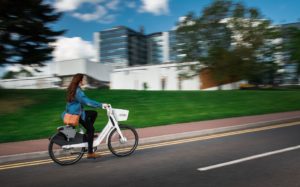Derby Electric Bike Share Program a Surprising Success

The UK northern industrial city of Derby has recently seen the launch of the U.K.’s biggest electric bike sharing scheme.
Comprising of some 200 electric bikes, the program is wholly owned by Derby City Council and run by the bike sharing company Hourbike using e-bikes made by US company Social Bike.
The scheme was soft launched in July, with 50 electric bikes stationed at various industrial, academic and publicly accessible docking stations across the city.
According to a statement from Derby City Council, “Docking stations will be based across the city at various University of Derby sites, Rolls-Royce, the Railway Station, Derby Arena, the Council House, the Market Place, Victoria Street, The Spot, Castle Ward, the Roundhouse, Royal Derby Hospital and the Rail Technology Centre.”
Uptake Has Taken Operators Aback
In the first month of operation, the 50 available bikes were ridden a total of 7,200 miles.
Owner and managing director of Hourbike Tim Caswell told the Electric Bike Report, “The average distance ridden was 3.3 miles per trip, which is bigger than traditional shared bike trips, that tend to be used for shorter distances. The longest trip that of all was 25 miles, the trip length in terms of time and distance was far longer and higher than anticipated at the start of the scheme.”
Caswell has been operating shared bike schemes across the the United Kingdom since 2007. Only recently did he move into electric bike sharing, using small numbers of Social Bike electric bikes in larger traditional bike sharing schemes that Hourbike operates.
Caswell continued, “At peak time the 50 bikes were used four times a day and an average of 20 miles per bike per day.”
The shared e-bikes can be locked at a docking station or for a small fee, at a secure point anywhere in Derby. This hybrid scheme allows greater flexibility for the user, who might be cycling away from the docks around the city.
In some cases they have been found locked in people’s gardens after they have been used to commute home. Due to a tracking system on the bikes they can retrieved by Hourbike staff and moved to the nearest docking station or to be charged / maintained.
The main focus of the bike sharing scheme has been on the academic and industrial campuses of the University and major employers of the city. Caswell explained, “There are docks at the major industrial campuses of Rolls-Royce and Bombardier to try to encourage people to use e-bikes instead of cars to get around. What we didn’t expect was how well the public would receive them, and uptake has been much higher than among the traditional bike sharing schemes that I run elsewhere.”
The wider general public has really taken the electric shared bikes to heart and that there has been a lot of use by people who were not necessarily targeted by the electric bike sharing scheme. Caswell said, “The bikes are so much fun to ride that people are riding them to leisure rather than utility purposes.”
As the dark winter months come to this part of the world, and university students get back from their vacations (the university has been a major sponsor of the scheme), there may well be a change towards more utilitarian use in the coming months.
By this stage all 200 Electric bikes should be in operation.
Dumping and Misbehavior
Along with bike sharing comes the inevitable local newspaper scare story of bikes being misused and abused in and around the area. The Derby Telegraph did find a certain amount of abuse taking place, and somewhat predictably pounced on the story.
According to Caswell, the problem was really not as bad as the local media might have you believe. He said, “The bikes can be locked to themselves and this is misconceived as ‘dumping’.”
Those using the bike will have been charged their fee to use it as well as the £2 fee for not locking it to a dock so will have paid for the privilege of locking the bike into itself. Caswell continued, “The bikes are tracked, we know where they are, and we spend time making sure that the bikes are stored where they should be around the city.”
Caswell added that the majority of accounts that have been suspended are due to lack of money to cover the journeys that had been done on the machines – not for so-called abuse. He quipped, “We have been a victim of our own success to some extent, but I prefer to be saying that the bikes are overused rather than under-used!”
A Success Overall
The scheme in its short life has been very successful, with the e-bikes used in ways that traditional bike sharing schemes just do not see.
Caswell concluded, “I’m heartened by what has happened in Derby. There is a place for e-bike sharing elsewhere, and would hope to see more towns and cities take on such schemes in the next year.”
–By Richard Shrubb
P.S. Don’t forget to join the Electric Bike Report community for updates from the electric bike world, plus ebike riding and maintenance tips!







